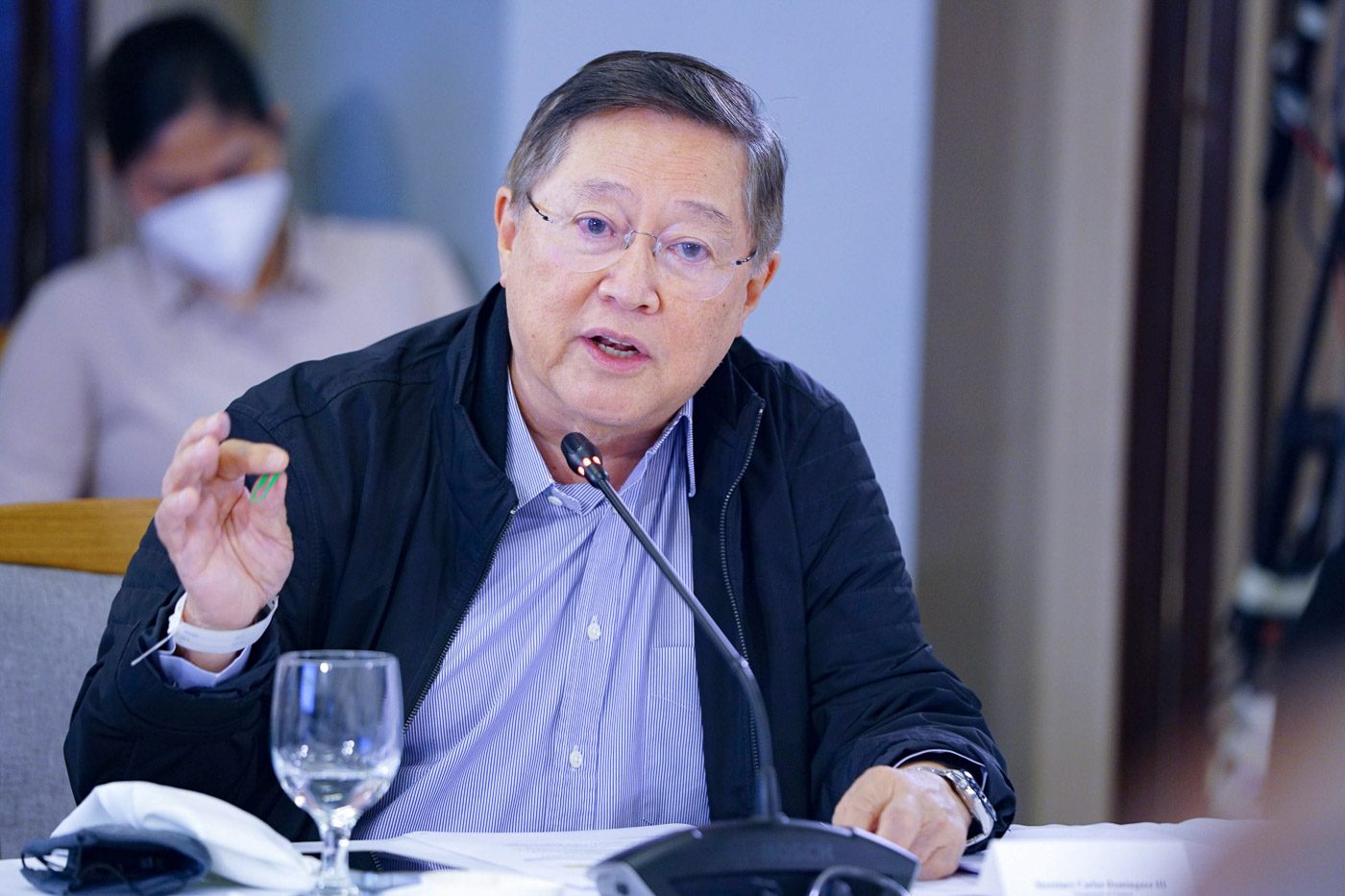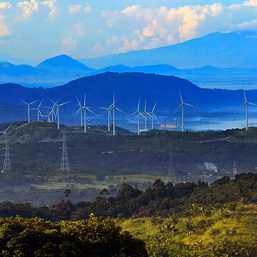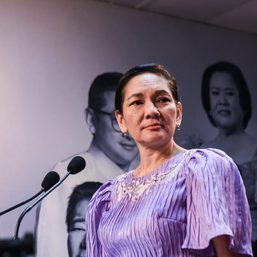SUMMARY
This is AI generated summarization, which may have errors. For context, always refer to the full article.

MANILA, Philippines – Ten days before the end of the Duterte presidency, Finance Secretary Carlos Dominguez III withdrew the Philippines from the Extractive Industries Transparency Initiative (EITI), a mechanism that ensured the government discloses key information about extractive industry operations and earnings, and engages with environmental activists and communities.
The move is a last-minute reversal by the Duterte government of an initiative by the late Benigno Aquino III. The Philippines joined the EITI in 2013 after Aquino issued an executive order meant to reform the mining industry.
The Department of Finance (DOF), in a press release on Thursday, June 23, said Dominguez had written last June 20 to EITI chairman and former New Zealand prime minister Helen Clark of the Philippines’ decision.
The DOF, which chairs the Philippine EITI, took issue with the way in which the country was assessed by EITI in coming up with its February 2022 implementation score.
“We find that the manner by which the EITI Board undertakes its Validation is unduly subjective, biased and unfair. The Philippines has no confidence in the ability of the EITI to undertake an impartial, transparent, and evidence-based Validation process,” said Dominguez.
Dominguez: ‘We refuse to be taken hostage’
The root of the Duterte administration’s displeasure was the EITI Board’s finding that the Philippines had only “partly met” an EITI standard on full engagement with civil society.
The EITI Board pointed to “government constraints on freedom of expression, operation, and association in the EITI process” and even specifically mentioned the feared anti-terrorism law championed by President Rodrigo Duterte at the behest of retired military generals in his Cabinet.
“Validation identified alleged instances of intimidation of civil society activists and journalists. It is possible that these are linked to the interventions or stated positions of these individuals on extractive operations or on issues concerning extractive investments. Validation also identified the apparent use of the 2020 Anti-Terrorism Act to justify attempts at police intervention, judicial action or intimidation which may have limited civil society freedoms,” reads part of the report.
Dominguez assailed the use of ‘irrelevant metrics’ and alleged reliance on “unvalidated reports,” said the DOF. He said the EITI was making impositions on the Philippines that “violate the country’s sovereignty.”
“We refuse to be taken hostage by unverified allegations from foreigners and people who have no mandate from the electorate,” said Dominguez.
It was a “shadow report” by civil society organizations involved in EITI that detailed instances of red-tagging of some members and a climate of fear among environmental defenders that formed part of the basis for the EITI Board’s finding.
The civil society members of the Philippine EITI were informed only at the last minute by DOF of the withdrawal. Jaybee Garganera of Alyansa Tigil Mina said they only found out only on Monday when told that Dominguez had ordered a drafting of the withdrawal letter.
Finance Undersecretary Bayani Agabin, Philippine EITI focal person and chair, said there was no need to consult civil society members of the body’s Multi-Stakeholder Group (MSG) because participating in EITI was a “voluntary government commitment” and thus withdrawal from it was “solely a government prerogative.”
“Moreover, the decision was not made lightly. Both the MSG and the EITI were informed of the concerns of the government as early as November 2021. Unfortunately, none was forthcoming, thus, the decision to withdraw,” he said in a message to Rappler on Friday.
Why this matters
Cielo Magno, board member of Bantay Kita, the civil society member of the Philippine EITI which wrote the “shadow report” that has angered DOF, said the withdrawal came as a shock to them. They believed the correctional measures they were asking from the government were relatively straightforward and simple – like denying communist affiliations of some of their red-tagged members.
Magno said the country’s withdrawal has a “significant impact” on transparency and accountability in the mining, oil, and gas industries – industries which hugely affect communities, the environment, and the economy.
Being part of EITI was what helped ensure that the government and companies regularly disclose reports on revenue, amount of natural resource extracted, payments made to indigenous peoples and communities, efforts to address environmental degradation, and more.
The process of securing free prior and informed consent of communities where mining would take place was monitored and documented through EITI reports.
“Environment and social reporting is also a part of EITI so it gives transparency and at least a better understanding, especially at the community level, on what the environment and social impacts are of specific mining activities,” explained Magno, who also sits as EITI board member, to Rappler.
“If you’re interested to see what’s going on in a company, you just look at the annual EITI report and it’s there,” she added.
EITI reports also helped local governments ensure extractive firms are regularly releasing their share of revenue from mining activities in their areas.
With the Philippines’ withdrawal from EITI, those transparency measures could disappear.
Dominguez, in the Thursday press release, promised to ensure the development of resources would be “open, accountable, and responsive to the needs and aspirations of Filipinos.” He said the government had everything in place to ensure “transparency” in the extractive industry.
Magno agrees it’s possible for the DOF to continue EITI initiatives on its own. But without engagement ensured by EITI, there’s no stopping government from backsliding into less transparent ways.
“The problem with that is there’s no monitoring, there’s no guarantee. One, there’s no standard to check the extent of disclosure,” said Magno.
But, more importantly for Magno, government would lose a reason to genuinely engage with environmental groups, civic society, and communities – the people affected by the extractive operations themselves.
“For citizens to have that freedom to criticize government and hold government accountable, that’s the other half of EITI that’s more important. Because if you don’t have accountability, what’s the point?” she said.
Existing laws, like the Indigenous Peoples’ Rights Act, already require government and companies to address concerns of affected communities. But history has shown that laws are not always implemented and loopholes make abuses still possible.
The EITI places one more level of safeguard to keep government and companies on their toes.
Then there’s the question of legality. Can Dominguez withdraw from EITI when membership to it was among the provisions of an executive order? Aquino’s EO 79 committed the country to “participate” in the EITI while his EO 147 created the Philippine EITI.
Preemptive decision?
Garganera and Magno believe the DOF’s withdrawal may have been an attempt to preempt a possible “suspension” of the Philippines by the EITI Board.
In EITI rules, garnering a “partly met” score in one of the metrics merits “suspension.” Suspension, however, is not the same as delisting or being taken out of EITI. It only means the member country must urgently address gaps identified by the EITI validation report.
But the EITI Board, in February, said it had not decided to declare a “suspension” for the Philippines. It would instead wait to see progress made in an October meeting.
But before that reassessment could take place, Dominguez withdrew the Philippines from the EITI.
“They want to avoid any embarrassing situation if the Philippines gets full suspension a few months from now, when we fail to comply with recommendations,” said Garganera.
The DOF, through Undersecretary Agabin, denied this in a message to Rappler on Friday.
“No, we are not preempting anything. In fact, what we prevented is the unfair treatment from organizations with no transparency. As we had stated, the issue is fairness in the manner by which EITI conducts its validation,” he said.
Magno also wondered why Dominguez would make such a move with only a few days left in the Duterte administration. Why not leave the matter to be decided by his successor and erstwhile fellow Duterte Cabinet member, Benjamin Diokno?
Garganera voiced a suspicion that the move was Dominguez’ last gift to the mining industry before leaving the DOF.
“We hope that this move to withdraw from EITI is not part of the re-entry plan of Secretary Dominguez to the extractive industry when he steps down from his government position on June 30, 2022,” said Garganera.
Dominguez had drawn much attention from environmental groups for his and his family’s past involvement in mining companies. His brother Paul Dominguez was president of Sagittarius Mines Inc. from 2005 to 2007. He resigned from the SMI board in 2016.
Secretary Dominguez himself served as a director at Alsons Consolidated Resources, a firm involved in exploring for oil, gas, and mineral resources, until 2016.
Both companies have either a direct or indirect interest in Tampakan mine, said to be the Southeast Asia’s biggest untapped gold and copper reserve.
In 2021, the Duterte administration brought the Tampakan project one step closer to development with the lifting of the open-pit mining ban. Dominguez had expressed support for the end of the moratorium. – Rappler.com
Add a comment
How does this make you feel?



![[WATCH] Bamban POGO scandal: There’s a bigger fish than Alice Guo](https://www.rappler.com/tachyon/2024/07/inside-track-tcard-bamban-pogo.jpg?resize=257%2C257&crop=435px%2C0px%2C1080px%2C1080px)
![[Vantage Point] China’s silent invasion of the Philippines](https://www.rappler.com/tachyon/2024/07/TL-china-silent-invasion-july-16-2024.jpg?resize=257%2C257&crop=318px%2C0px%2C720px%2C720px)





There are no comments yet. Add your comment to start the conversation.